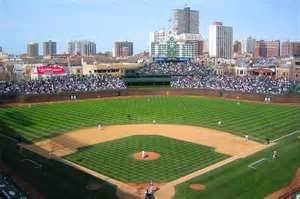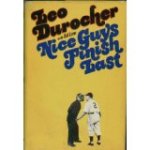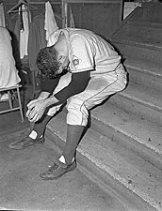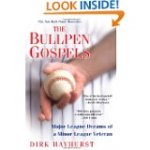I was re-reading Leo Durocher’s Nice Guys Finish Last the past few days, and I have to say there’s a lot chew on from the book. Unfortunately, there are things I would have liked to have known more about, but were left out of this 1975 autobiography.
One thing that really struck me was the tiny bit of information devoted to the Chicago Cubs collapse of 1969. Cubs fans who are old enough will recall that as the year Leo’s team lost the Eastern Division of the National League to the New York Mets after being comfortably ahead in the standings in August.
Leo alludes to the fact that everything went wrong for the Cubs in the stretch run, but he doesn’t give details. What about some of the crazy tales of that season? How about the black cat that walked onto the field past Ron Santo at Shea Stadium? He doesn’t even talk about that, or some of those games between the two teams. There’s mention about his team possibily being tired down the stretch. Leo has sometimes been blamed for not resting his regulars enough that season. He does talk about the heat he took for secretly taking off a day during that ’69 season to visit his son in Wisconsin, an act in itself I found curious.
Those Cubs teams of the late 1960s and early 1970s were good ones, but Leo failed to bring home a division title to Chicago in those years. Players included Ron Santo, Jim Hickman, Ferguson Jenkins, Milt Pappas, Glenn Beckert, Billy Williams, Randy Hundley, Don Kessinger, and of course, the great Ernie Banks.
Leo talks about an aging Banks, how he was forced to regularly pencil the legendary Cub’s name into the lineup each day, despite his aching knees and declining play. He felt he was in a no-win situation with Mr. Cub – an icon in Chicago. Not playing Banks would have the fans screaming for his head. Play him and he gets hurt, and the fans blame it on Leo.
Leo has other interesting observations about some his players. Santo, he claims, was a more than solid player, but not so good when the games counted. He talks about the famous clubhouse blowup he had with Santo too. It’s clear there’s no love lost between Durocher and Pappas, whom Leo accuses of being a big mouth and clubhouse lawyer.
He doesn’t even mention Ferguson Jenkins, his best pitcher of those years. Why? Beats me. It was Leo who took Jenkins out of the bullpen and made him a starter. Jenkins would go on to win twenty games six years in a row.
Leo was known as “The Lip”, a brash and cocky and colorful character with a great baseball mind. He had his share of feuds and got into his share of hot water throughout his long baseball career. He was glib and a charmer. As both a player and a manager, he was aggressive. He loved to bait umpires. Branch Rickey once said of Durocher that he had an infinite capacity for making a bad situation worse. Leo would play and manage for Rickey, first in St. Louis, later in Brooklyn. He saw Rickey for what he was: A shrewd, tight-fisted baseball operator who knew how to manipulate players and managers. The church-going Rickey was also a man for whom Leo had great respect.
While being considered for his first managerial job for the Dodgers, general manager Larry McPhail interviewed Durocher and considered his qualifications. He questioned if Leo was smart enough, told him he couldn’t handle himself, let alone a ball club.
I never had been able to handle myself responsibly? So what? That isn’t what players look for or respect you for. They’re not college students, they’re professional athletes. Physical men. They respect the pitcher who knocks them down and the base runner who bowls them over. They respect the guy who picks up the big pots in the card games. They respect the guy who lives hard and flies high.
Which pretty much summed up Leo as a player and manager.
Durocher’s fights with McPhail were the stuff of high comedy. McPhail would get drunk, fire Leo and hire him back the next day. Leo details some of these scrapes in the book. In 1941, Leo led the Dodgers to their first pennant in twenty-one years, only to see his team fall to the New York Yankees in the World Series.
In 1947, Leo was suspended for suspected ties to gambling. He had to sit out the season and watch his Dodgers win the pennant, though they lost once again in the Series to the Yankees. Later, he managed the New York Giants where he led them to two pennants and a World Series title.
Babe Ruth dubbed Leo “The All American Out.” And while it was true Leo wasn’t much of a hitter in his playing career, he was a slick-fielding shortstop with a keen baseball mind. He was the glue of the St. Louis Cardinals “Gas House” teams of the 1930s. Leo shares stories from those years with tales about some of his raw-boned, colorful teammates – Pepper Martin, Joe Medwick and Dizzy Dean.
Leo liked to run with the Broadway and Hollywood crowd, and there’s a few stories here as well. He was big pals with Frank Sinatra and lived with the actor George Raft. Leo liked the good life, nice clothes, money and women. He was married three times, including to actress Larraine Day.
Street smart, a hustler, he would have fit in just fine with some of Damon Runyon’s Guys and Dolls characters. Rickey seemed to tolerate some of his questionable behavior and the company he kept. Leo, for his part, wondered what all the fuss was about and why baseball officials sometimes felt it necessary to call him on the carpet.
All in all, it’s an interesting book with enough baseball stories from days long gone by to satisfy any baseball fan.



